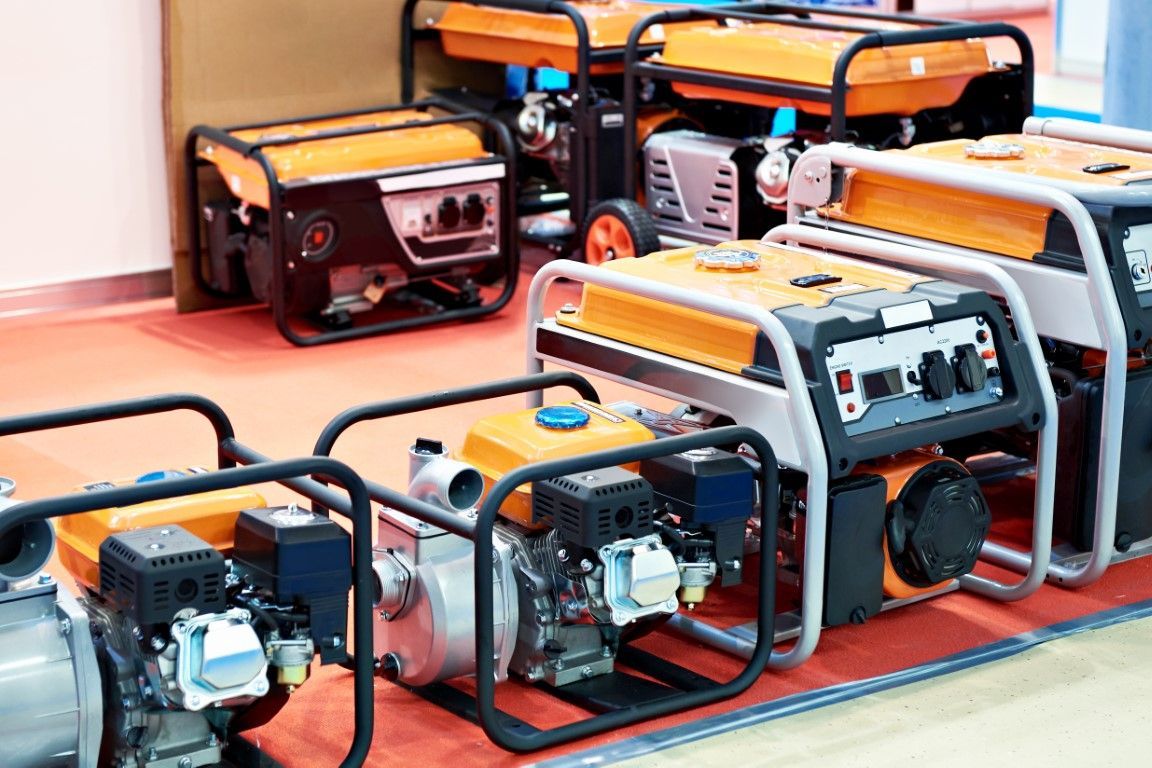
A portable generator is a versatile, compact power source that can be moved easily from one place to another. Unlike permanent generators, portable generators are designed to provide electricity in various settings, whether for emergency use during a power outage or for recreational activities. They typically run on gasoline, propane, or diesel and are equipped with outlets to power various devices and appliances.
Primary Uses and Benefits
Portable generators offer numerous advantages. One of their most significant benefits is providing backup power during outages. This ensures that essential appliances like refrigerators, heaters, and medical devices remain operational, even when the main power supply is interrupted. Additionally, portable generators are valuable for outdoor activities such as camping or tailgating, where they can power lights, cooking equipment, and entertainment devices.
Their portability makes them a practical choice for job sites where temporary power is needed. Construction workers and contractors often use them to power tools and equipment in areas without electricity. In short, portable generators offer flexibility, reliability, and convenience in various situations.
Importance of Portable Generators
Portable generators play a crucial role in ensuring that people can maintain their daily routines and safety during power outages. They provide a sense of security by keeping essential services running and preventing food spoilage. For businesses, they can prevent losses by ensuring that operations continue without interruption. For outdoor enthusiasts and workers in remote areas, they make activities and tasks more manageable and comfortable.
Types of Portable Generators
Portable generators come in several types, each suited to different needs:
- Inverter Generators: Known for their quiet operation and clean power output, inverter generators are ideal for sensitive electronics like laptops and smartphones. They are often used for camping and other outdoor activities due to their efficiency and low noise levels.
- Traditional Generators: These generators are generally more powerful and can handle higher wattages, making them suitable for home backup and job site use. They tend to be louder and less fuel-efficient than inverter models.
- Dual-Fuel Generators: Offering the flexibility to run on either gasoline or propane, dual-fuel generators provide more options for fuel supply and are useful in emergencies where one fuel type might be unavailable.

We will get back to you as soon as possible.
Please try again later.
Key Features to Consider
When choosing a portable generator, several key features should be considered:
- Power Output: Determine the wattage needed to run your essential appliances and devices. Generators come in various sizes, so choose one that matches your power requirements.
- Fuel Type: Consider the availability of fuel sources and the type of generator that best fits your needs. Gasoline is common, but propane or dual-fuel options offer additional flexibility.
- Run Time: Evaluate how long the generator can run on a full tank of fuel. This will impact how long you can use it before needing to refuel.
- Noise Level: For residential use or activities where noise is a concern, look for a generator with a quieter operation. Inverter generators are generally quieter than traditional models.
- Portability: Check for features like handles or wheels that make it easier to move the generator. Lightweight and compact models are easier to transport.
Maintenance and Care
Proper maintenance ensures the longevity and efficiency of your portable generator. Regularly check and change the oil, clean or replace the air filter, and inspect the spark plug. Additionally, keep the generator clean and free of debris, and run it periodically to ensure it remains in good working condition. Always refer to the manufacturer's guidelines for specific maintenance tasks.
If you’re considering a
portable generator in Baltimore, MD, our team is here to help. We offer a range of models to fit your home or business needs and provide expert advice on selection, installation, and maintenance. Contact us today to learn more about our products and services, and ensure you’re prepared for any power needs that come your way.
Applications and Use Cases of Portable Generators
Portable generators are versatile and essential tools for various situations, from providing backup power during outages to supporting outdoor activities. Understanding their applications and use cases can help you make the most of these handy devices. This guide explores the primary uses of portable generators and how they can benefit you in different scenarios.
Emergency Backup Power
One of the most common uses for portable generators is to provide backup power during electrical outages. When a storm, natural disaster, or other event causes a power cut, a portable generator can keep essential appliances and systems running. This includes:
- Refrigerators and Freezers: Keeping your food from spoiling by maintaining a cold temperature.
- Medical Equipment: Ensuring that critical medical devices continue to operate.
- Heating and Cooling Systems: Maintaining a comfortable temperature in your home.
- Lights and Small Appliances: Providing illumination and power for everyday tasks.
Outdoor and Recreational Activities
Portable generators are popular for various outdoor activities, making them a valuable addition to camping trips, tailgating events, and other recreational outings. They offer:
- Power for Camping Equipment: Running devices like portable refrigerators, coffee makers, and small heaters.
- Entertainment: Charging electronics such as smartphones, tablets, and laptops, and powering small TVs and radios.
- Convenience: Allowing you to enjoy modern comforts even in remote locations.
Construction and Work Sites
In construction and work environments, portable generators are crucial for powering tools and equipment. They provide:
- Power for Tools: Running power tools like drills, saws, and compressors when working away from a power source.
- Job Site Lighting: Ensuring that work can continue safely and efficiently in low-light conditions.
- Heavy Equipment: Supporting machinery that requires substantial power for operation.
Events and Festivals
Portable generators are essential for events and festivals where access to electricity may be limited. They are used for:
- Food and Beverage Vendors: Powering cooking equipment, refrigerators, and point-of-sale systems.
- Entertainment Systems: Running sound equipment, lighting, and other electronics for performances and shows.
- Vendor Stalls: Providing power for various activities and services offered at the event.
Emergency Situations
In emergency situations where access to power is crucial, portable generators play a vital role. They are useful for:
- Disaster Relief: Assisting in relief efforts by providing power for communication, lighting, and essential operations.
- Temporary Housing: Powering utilities in temporary shelters or makeshift accommodations during disasters.
- Healthcare Facilities: Supporting medical facilities in maintaining operations when their primary power sources are disrupted.
Home Improvement Projects
During home improvement projects, portable generators offer a reliable power source for various tasks. They can:
- Power Construction Tools: Running tools required for renovations, repairs, or landscaping.
- Support Outdoor Work: Providing electricity for tasks like outdoor lighting installation or power washing.
Backup Power for Remote Locations
For those living in remote or off-grid locations, portable generators can serve as a primary or supplementary power source. They can:
- Supply Power Continuously: Offering a steady source of electricity for daily use in areas without a reliable power grid.
- Provide Convenience: Enabling the use of appliances and electronics that rely on electrical power.

Portable generators are incredibly versatile and serve many purposes across various settings. From emergency backup power to enhancing outdoor experiences and supporting work sites, their applications are vast and varied. By understanding these use cases, you can make informed decisions about how to best utilize a portable generator to meet your needs and ensure you're prepared for different scenarios.
Identifying the Most Suitable Portable Generator for Your Specific Needs
Choosing the right portable generator can make a big difference when it comes to powering your home, RV, or job site during emergencies or everyday use. With many options available, it’s important to find a generator that fits your specific needs. Here’s a guide to help you select the best portable generator for your situation.
Understand Your Power Requirements
Before purchasing a portable generator, it's crucial to determine what you need to power. Consider the following:
- Essential Appliances: List the appliances and devices you need to run during an outage. This might include refrigerators, lights, heating or cooling systems, and medical equipment.
- Power Consumption: Each appliance has a wattage requirement. Sum up the total wattage needed, including the surge wattage (the extra power needed to start appliances) and running wattage (the power needed to keep them running).
Choose the Generator Size
Generators come in various sizes and capacities. The right size for you depends on your power requirements.
- Small Generators (1,000 to 2,500 watts): Suitable for powering small devices and a few appliances, such as lights, a mini-fridge, and a laptop.
- Medium Generators (2,500 to 5,000 watts): Ideal for larger homes or RVs. They can handle more appliances simultaneously, including a refrigerator, microwave, and several lights.
- Large Generators (5,000 to 10,000 watts or more): Designed for whole-house backup or larger job sites. They can power most household appliances, HVAC systems, and more.
Fuel Type
Portable generators run on various fuel types, each with its benefits and drawbacks:
- Gasoline: Common and widely available, but can be unstable and requires regular refueling.
- Propane: Burns cleaner and has a longer shelf life compared to gasoline. However, it requires a propane tank and might be less available in emergencies.
- Diesel: Typically found in larger generators. Diesel fuel is efficient and has a long shelf life, but diesel generators are usually more expensive and louder.
- Dual-Fuel: Some generators can run on both gasoline and propane, offering flexibility based on fuel availability.
Consider Noise Levels
Noise is an important factor, especially if you’re using the generator in a residential area or campsite. Look for generators with lower decibel ratings if noise is a concern. Many models are designed to be quieter and have noise-reducing features.
Evaluate Portability and Storage
Portability is a key feature of portable generators. Consider:
- Weight and Size: Ensure the generator is manageable for transport and storage. Some models come with wheels and handles for easy movement.
- Design: Look for compact designs if you have limited storage space.
Check for Additional Features
Modern portable generators come with various features to enhance convenience and safety:
- Electric Start: A feature that allows you to start the generator with the push of a button, eliminating the need for manual recoil starting.
- Automatic Voltage Regulation (AVR): Helps protect sensitive electronics from power surges.
- Low Oil Shutoff: Automatically turns off the generator when oil levels are too low, preventing engine damage.
- Multiple Outlets: Ensure the generator has enough outlets to meet your needs, including standard and USB outlets.
Budget and Warranty
Finally, consider your budget and the warranty offered:
- Budget: Portable generators vary widely in price. While it’s tempting to go for the cheapest option, investing a bit more can provide better performance and reliability.
- Warranty: Check the warranty period and what it covers. A good warranty can provide peace of mind and protect your investment.
Choosing the right portable generator involves evaluating your power needs, considering fuel types, and understanding features and portability. By carefully assessing these factors, you can find a generator that will meet your needs effectively, providing reliable power when you need it most.
Let's Connect!
We offer top-notch standby whole-house generators to ensure uninterrupted power supply during outages. With our expertise and commitment to quality, you can trust us to provide reliable backup solutions tailored to your needs. Hire us today for peace of mind knowing your home or business is protected against power interruptions.